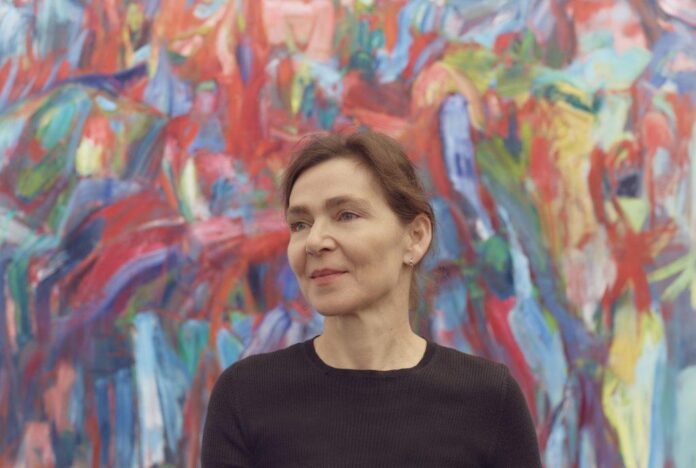Cologne-based German artist Sabine Moritz’s painting practice is recognized for its exploration of the dynamics and nuances of memory and time, and the myriad influences, experiences, and interventions that shape both personal and collective perceptions of each. Inherently subjective and mutable, memory is interpreted by Moritz through a spectrum of abstract and figurative means, allowing the artist to document, or construct rather, idiosyncratic memory and ideas centering on memory through paint—making the intangible tangible. Frequently working through series, Moritz’s work in turn approaches more general themes such as ephemerality and memory deterioration as well as deeply personal memories, such as her childhood in East Germany.
Opening this Thursday, April 27, 2023, Moritz has two concurrent exhibitions opening with Pilar Corrias in London. The dual exhibitions will be presented at each of the gallery’s two locations: “Under the Skin” on Savile Row, which will be on view through June 3, 2023, and “Heart of Drought” on Eastcastle Street through June 17, 2023. The two shows are elementally contrasting yet complementary, allowing visitors to experience a range of Moritz’s thematic explorations.
We reached out to Moritz to learn more about the exhibitions, and what she’d like to work on next.

Sabine Moritz, (2022). Courtesy of the artist and Pilar Corrias, London.
Your forthcoming exhibition with Pilar Corrias is at two locations. Can you tell us a bit about what works are included respectively, and the relationship between them?
The works displayed in each location are abstract paintings (works on canvas or paper), which in the broadest sense are each associated with themes of the inner and outer world. This is expressed in the choice of the two show titles: “Heart of Drought” stands for the former and “Inside the Heart” for the inner world.
Was your intention always to present your work dichotomously, or was this an idea that evolved organically?
This idea arose from the opportunity to exhibit in both galleries at the same time. I thought it was nice using the two themes to create an arc of suspense between the two places.
What were some of the sources of inspiration you worked with when creating this body of work?
To give a few examples, alongside a multitude of unconscious influences: the Titian exhibition “Love, Desire, Death” a few years ago (2020/21) at the National Gallery, a documentary about the sailor Magellan, strolls, looking out the window, and, regrettably, also the daily news.

Sabine Moritz, (2022). Courtesy of the artist and Pilar Corrias, London.
How do the present works relate to or fit within your overarching practice?
Many of the artworks are a continuation of the previous series. This becomes evident in numbered titles.
What would you like the experience for visitors to these shows be like? Is there one they should see first before the other?
There is no sequence. Either you go from the “inside” to the “outside” or from the “outside” to the “inside.” I would be happy if the visitors see something in the pictures and enjoy them.
Can you tell us about what you are working on now? Or do you have something you’d like to work on next?
Essentially, I just want to keep working, try larger formats and maybe take up figurative themes again.
Have you seen any exhibitions recently that you found particularly intriguing or impactful?
I just saw “Hugo van der Goes” at the Gemäldegalerie Berlin.

Sabine Moritz, Kamtschatka IV (2022). Courtesy of the artist and Pilar Corrias, London.

























